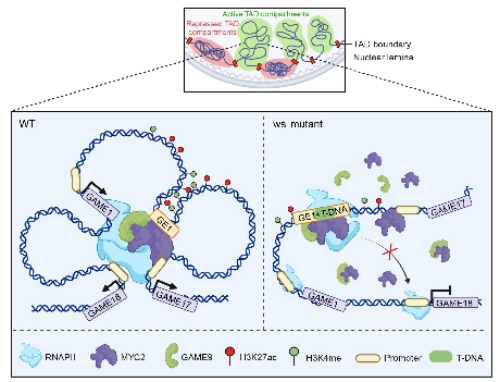Nature Communications published a research paper titled "A Distal Enhancer Guides the Negative Selection of Toxic Glycoalkaloids During Tomato Domestication" by Mingchun Liu's research group from the College of Life Sciences, Sichuan University on April 3. Sichuan University is the first signatory unit, and the first authors of the paper are Feng Bai, a Class 2020 doctoral student, and Peng Shu, a graduate with a master's degree. The corresponding authors are Professor Mingchun Liu and Professor Mondher Bouzayen.

"Steroidal glycoalkaloids (SGAs) are major plant defense metabolites against pests, while they are considered poisonous in food. The genetic basis that guides negative selection of SGAs production during tomato domestication remains poorly understood. Here, we identify a distal enhancer, GAME Enhancer 1 (GE1), as the key regulator of SGAs metabolism in tomato.GE1 recruits MYC2-GAME9 transcriptional complex to regulate the expression of GAME cluster genes via the formation of chromatin loops located in the neighboring DNA region. A naturally occurring GE176 allelic variant is found to be more active in stimulating GAME expression. We show that the weaker GE1 allele has been the main driver for selecting reduced SGAs levels during tomato domestication. Unravelling the "TFs-Enhancer-Promoter" regulatory mechanism operating in SGAs metabolism opens unprecedented prospects for SGAs manipulation in Solanaceae via precision breeding strategies." (Abstract)
In short, this study reveals the molecular mechanism by which the transcription factor enhancer promoter regulates the metabolism of steroidal glycoalkaloids in tomato fruits.

The model of GE1-mediated regulation of expression of GAME cluster
Mingchun'Liu s research group has long focused on the regulatory mechanisms of fruit quality formation and maintenance in horticultural crops. The research group has published research findings in well-known domestic and foreign journals such asDevelopmental Cell, Nature Communications, Plant Cell, Molecular Plant, New Phytologist, Journal of Integrated Plant Biology, Plant Physiology, etc., systematically analyzing the molecular basis of fruit ripening, softening, color formation, flavor and nutritional quality metabolism, as well as post-harvest resistance over the past five years. The research results not only lay a theoretical foundation for the breeding of high-quality, storage and transportation resistant fruits, but also provide new targets for the regulation of fruit quality and the development of post-harvest storage and transportation preservation technologies.
Souce: https://www.nature.com/articles/s41467-024-47292-7
